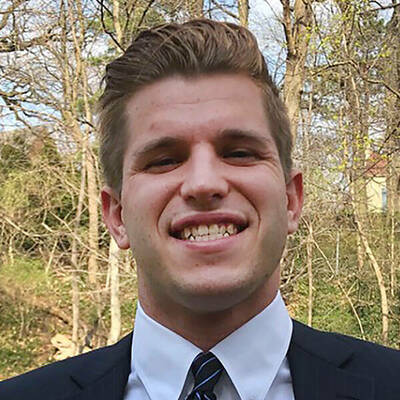Davis Lovvorn

Davis Lovvorn is a third year law student from Nashville, TN. A former high school Spanish teacher in Charlotte, NC, through Teach for America, Davis is excited to use his law degree to return to Charlotte to work at Charlotte Center for Legal Advocacy through Immigrant Justice Corps in youth asylum law. In his free time, Davis enjoys running and cheering for his favorite sports teams, which he will discuss with you until you tell him to stop.
“Problems facing immigrants do not just begin or end with their experience in immigration court. Immigrants face real issues inside the United States as well that stem from systemic discrimination at so many levels."
When – and how – did you first develop an interest in law as a tool for helping the marginalized?
In the two years before coming to law school, I was a Spanish Instructor at Vance (now Chambers) High School, a Title I school in Charlotte, NC, through Teach for America. There, I worked with many children with immigrant backgrounds. However, I was dismayed at the lack of equitable opportunities my students received at a Title I school. I was thus inspired to pursue the field of immigration law to make not only an individual impact but to enact systemic change.
I also was particularly inspired by my work with the Senior Exit Projects for our English as a Second Language (ESL) students. Many of these students were immigrants and overcame numerous obstacles in their day-to-day lives. Having the opportunity to see these students put out incredible quality of work despite these obstacles while at the same time building strong relationships with them was the highlight of my time at Chambers. My Certificate of Appreciation, which all the ESL seniors signed, hangs in my bedroom in South Bend.
Has there been a mentor that has helped guide you, or a particular course or experience that helped shape your interest?
There are so many to name, but I have two. Professor Rudy Monterrosa's Immigration Law class was simply inspiring. Not only did I learn a substantial amount of important law, but I really enjoyed getting to present a Know Your Rights presentation in Spanish. I had a lot of fun with it. Rudy is such a good man, and I highly recommend anybody to take his course, even if you have no interest in Immigration Law. You will learn a lot!
I will also name the National Immigrant Justice Center externship led by Lisa Koop. My work partner, Pirie Maher, another 3L, and I were able to present a real asylum case involving a real client in front of a real immigration judge in Chicago. This experience was incredibly valuable for me, as it showed me the realities of how difficult my work will be. But Lisa was an incredible mentor, and Pirie was a great teammate. Anybody who wants to be intellectually stimulated and challenged while also making a real difference should participate in the externship.
You worked with the Mexican American Legal Defense and Educational Fund in Chicago as a Klau Institute Summer Fellow. Aside from the specific kind of work you did with them, what did you learn from the experience? What surprised you?
I worked with MALDEF in my 1L summer. MALDEF is an organization that advocates for the rights of Latinos in the United States. I worked on cases involving voting rights and employment discrimination. Not only did I receive important financial support through the Klau Center Fellowship, but also I gratefully appreciated the mentorship from professors Mitros Durham and Mason McAward that were valuable in helping me secure my fellowship.
I think what spoke to me the most about these experiences is that problems facing immigrants do not just begin or end with their experience in immigration court. Immigrants face real issues inside the United States as well that stem from systemic discrimination at so many levels. I only got to see and work with three - voting rights, employment, and education - but there are so many more areas that immigrants face discrimination in. It is important to acknowledge and address these systemic issues and work to rectify them.
Based on your experience to this point, what would you say is the biggest challenge facing young lawyers who aspire to put law in service of those most in need?
There are two important challenges in my eyes. The first is recognizing that this kind of career can be emotionally draining - because we are working on very real, very emotional issues! - and working to reduce burnout in whatever way it is that a young lawyer might do (for me, it is running).
The second is the reality that public interest attorneys do not make nearly as much money as those going into big law. I have zero issue for anybody who takes that career path. The money is real, and student loan debt is real! What we have to do is to make this career path more affordable, through increasing entry-level staff attorney salaries and through programs where those who demonstrate this commitment to public service can have their loans substantially forgiven.
What are you most inspired to tackle in your legal career? Are there specific issues, or constituencies, that you are drawn toward? Are there any specific outcomes you hope to see realized?
I am most inspired to return to Charlotte to work with the kids I worked with when I was teaching. Honestly, it's that simple. This is a full circle moment for me, and I am really excited to work with our kids who come from immigrant backgrounds in Charlotte again. And I want to make sure they receive the same opportunities as the kids who attend Myers Park or Charlotte Catholic and are able to pursue their dreams.